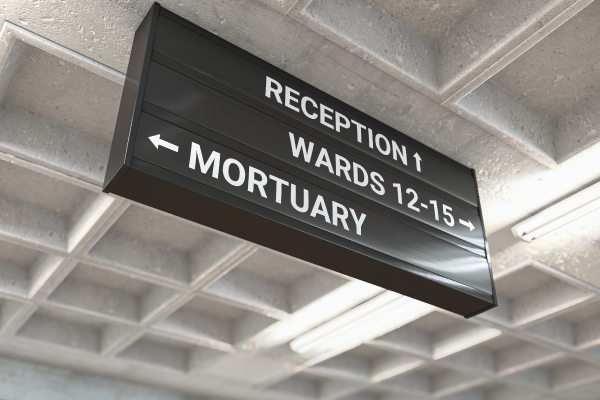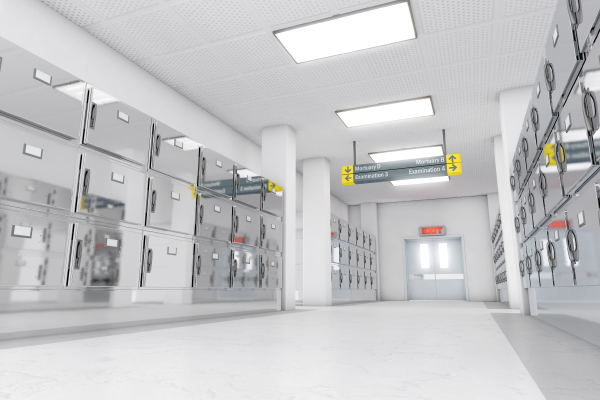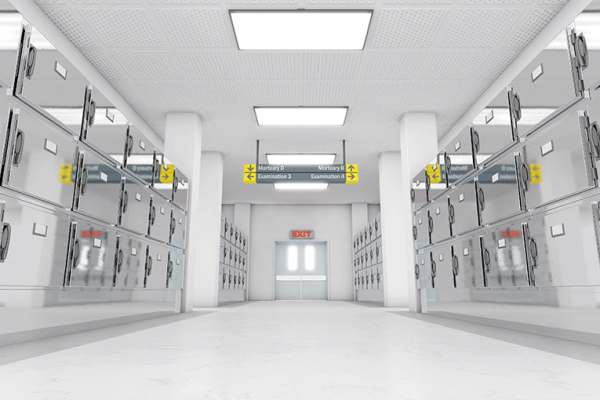How to become a mortician in the UK

Morticians provide an essential service in the healthcare lifecycle. Based in the mortuary of a hospital or forensic unit, a mortician will be involved in a wide range of tasks to support the effective day-to-day operations of the facility. This post will cover how to become a mortician in the UK, what the role of a mortician involves, what qualifications are required and what types of jobs are available.
What is a mortician?
In the UK, a mortician can work under a variety of job titles. They can be referred to as a mortuary assistant, a mortuary technician or an anatomical pathology technician (APT). A mortician can work in an administration and support role within a mortuary, interacting with the families of the deceased and ensuring a body is correctly presented for viewing. They will ensure the viewing areas are ready for visitors and participate in cleaning the instruments used before and after a post-mortem.
Both morticians and anatomical pathology technologists can also play important roles in assisting a pathologist with post-mortems to help understand the cause of death. Specialised training is required before any technical work is undertaken and once completed the mortician can support the post-mortem process as an invaluable member of the mortuary team.
How to become a mortician in the UK
A level 3 diploma in Healthcare Science (Anatomical Pathology Technology) is the industry standard qualification for those seeking to become an anatomical pathology technician. This is the job title for a mortician who works in an NHS hospital.
The diploma is awarded by the Royal Society for Public Health (RSPH) and involves a mixture of theoretical and vocational training under the supervision of trained professionals. Once a student has successfully completed the required training and obtained the diploma, they are eligible to join the RSPH as an associate member.
Whilst the level 3 diploma is the minimum required qualification for work as an assistant anatomical pathology technician in an NHS hospital setting, those who are interested in taking on a more senior level of responsibility can opt to progress to the level 4 diploma.
Only a small number of places are available to study the level 3 diploma each year and spaces can fill up quickly when applications open. If you are an international candidate with mortuary experience in your home country and you are interested in completing an RSPH diploma in advance of applying for a role in the UK, you can find out more about the course entry requirements here.
What can I expect as a mortician in the UK?
As a mortician working in the UK, you can expect to complete a variety of tasks on any given day. Whatever your level of qualification and experience, it is expected that a mortician will be comfortable with using IT systems to update and maintain mortuary records and have a good level of English for handwritten documentation.
In order to work as a mortician you will need to be prepared to complete many of the following responsibilities on a daily basis:
Arranging viewings
Mortuary viewings are frequently arranged with interested parties, including bereaved relatives for identification purposes. Viewings may also be arranged with the police to help with their enquiries. The mortician will also have the responsibility for updating the mortuary records once a formal identification is made.
Professional liaison
A mortician is likely to be involved in liaising with a range of related groups or persons involved in the handling or recording of the deceased. This can include contact with medical staff, police, the HM Coroner office and funeral directors.
Support and advice
A mortician will be expected to provide information to relatives and interested parties with queries on a range of documentation and procedures including post-mortem examinations, death certificates, cremation forms and insurance claims.
Maintaining cleanliness
As well as keeping the public viewing areas clean and presentable, a mortician can be involved in cleaning and sterilising the instruments and equipment used for a post-mortem.
Cadaver management
A mortician will frequently work with medical staff to receive bodies of the deceased into the mortuary. The mortician will place the cadaver into a refrigerated storage unit and keep a record of any personal property belonging to the deceased. A mortician can also help prepare the body for release to an undertaker.
Samples management
When samples are taken from the deceased, the mortician will be responsible for keeping records on the nature of the sample, the storage location and any samples sent away for laboratory analysis. Depending on experience and qualifications, a mortician may be involved in removing organs and obtaining samples directly from the body during a post-mortem, as well as recording the findings of a post-mortem exam.
How much will I be paid as a mortician in the UK?
Currently, the salaries for anatomical pathology technicians working in the NHS start at 22,816 for Trainee APTs, rising to £42,618 at the most senior level (which includes additional duties). This role can require being ‘on-call’ and working outside of standard hours. Locum APTs can expect to earn up to £40 an hour, depending on experience and the geographical location of the position.
Can I get a UK visa for this role?
If you are an overseas worker who has the appropriate qualification/s and interest in relocating to the UK to work as a mortician or anatomical pathology technician, you can view the latest UK government information on skilled worker visa eligibility here.
I’m interested in becoming a locum mortician
As one of the UK’s leading healthcare recruitment agencies, at Globe Locums, we offer a range of mortuary jobs for experienced candidates. If you are interested in becoming a mortician in the UK and experiencing life in one of the top destinations for qualified professionals, you can view current locum vacancies here.

Latest Mortuary Jobs
We currently have a variety of locum and permanent vacancies across the UK and Ireland




